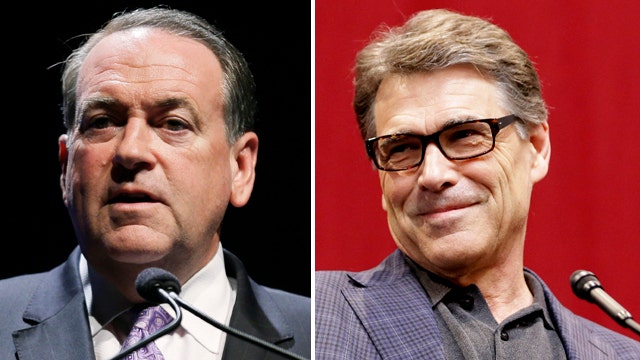Should politicians separate their beliefs from public life?
David Innes on whether faith has a place in politics
We are one year away from the Iowa caucuses and already several Republican presidential candidates are trying to secure an advantage by talking about their faith.
Before announcing his non-candidacy last Friday, Mitt Romney had indicated if he ran for a third time he intended to be more "open" about his Mormon faith. Mike Huckabee, former governor of Arkansas, regularly invokes his Baptist faith. And now Republican Gov. Scott Walker of Wisconsin, a self-described evangelical Christian, is testifying to his faith. There will be others.
Appearing at the Iowa Freedom Summit in Des Moines, Walker spoke about the successful battle he waged against his state's public unions over their attempt to expand bargaining rights. He told the audience, "You prayed for us. We could feel the power of those prayers."
The moral quality of America did not improve during the two terms of Ronald Reagan, who rarely attended church, or the one term of Jimmy Carter, who did. The moral compass did not point in a different direction during the two terms of George W. Bush, who said in a 2000 presidential debate that his favorite "philosopher" was Jesus.
This sounds a little like the cheers one hears at high school football games: "We've got spirit, how about you?"
The moral quality of America did not improve during the two terms of Ronald Reagan, who rarely attended church, or the one term of Jimmy Carter, who did. The moral compass did not point in a different direction during the two terms of George W. Bush, who said in a 2000 presidential debate that his favorite "philosopher" was Jesus.
In modern election cycles there has been a presumption among conservative Christians that if a politician goes to church, can quote Scripture, and mentions the name of Jesus, he is more qualified to become president than, say, a circumspect Episcopalian, or even an agnostic or atheist. The thinking is if "one of our own" gets elected president, his divinely inspired policies will trickle down to your adolescent daughter, who will stop sleeping with her boyfriend.
If only.
Recent history has proved the fallacy of that belief. The moral quality of America did not improve during the two terms of Ronald Reagan, who rarely attended church, or the one term of Jimmy Carter, who did. The moral compass did not point in a different direction during the two terms of George W. Bush, who said in a 2000 presidential debate that his favorite "philosopher" was Jesus.
The greatest warning against trusting politicians to improve a nation's virtue comes from King David. When he had all the power his theocracy could offer him in ancient Israel, he wrote, "Do not put your trust in princes, in human beings, who cannot save."(Psalm 146:3 NIV). A more direct paraphrase is found in the Living Bible: "Don't put your confidence in powerful people; there is no help for you there."
Jesus of Nazareth said, "My kingdom is not of this world" (John 18:36). Just as a nonbeliever has difficulty convincing an evangelical Christian to accept liberal beliefs about abortion, same-sex marriage and a host of other social issues, neither should Christians expect those who have a different theological perspective to accept their views absent a spiritual transformation.
It then becomes a power game, Christians being just one more "interest group" to be placated with a few breadcrumbs tossed at them by politicians seeking their votes.
What does true faith look like? The apostle James wrote to believers: "Pure and genuine religion in the sight of God the Father means caring for orphans and widows in their distress and refusing to let the world corrupt you." (James 1:27, New Living Translation)
Unfortunately, politicians can't raise money on that agenda and the likelihood of one getting elected on such a platform in our day is nil. But by embracing "true religion," one ultimately affects the social order in ways that the political system is incapable of doing.
This is not to say people shouldn't pray for those in authority, including those for whom they did not vote, because Scripture commands believers to do so. It is to say conservative Christians who salivate when politicians speak their "language" should heed King David's warning and the statement about the two kingdoms.









































